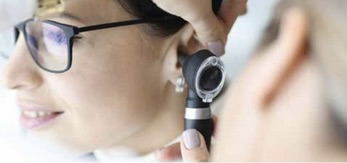
Courtesy HEARING SERVICES OF McKINNEY
As an audiologist, I’ve heard every excuse under the sun for avoiding hearing aids. “They’re ugly.” “They won’t help.” “I can’t afford batteries.” These aren’t just old wives’ tales—they’re myths that keep people from better hearing and, more importantly, better health. It’s time to clear the air and encourage a fresh look at what today’s technology really offers.
Let me start with compelling news. Recent research continues to confirm what we’ve long suspected: hearing aid use is linked with better cognitive health. A large UCLA Health study this year showed patients with hearing loss who wore hearing aids had a lower risk of dementia (UCLA Health). Another study of over half a million people found hearing loss raised dementia risk by 7 percent—but that risk diminished significantly with hearing aid use (JAMA Otolaryngology). In other words, dismissing hearing aids as cosmetic ignores a much bigger truth: they’re about protecting both mind and memory.
Myth #1: “Hearing aids are bulky and outdated.”
Many still imagine the oversized devices of decades past. But the devices I fit today are slim, discreet, and often nearly invisible. Many patients forget they’re even wearing them—until they notice how much better life sounds.
Myth #2: “They won’t work with my phone or streaming devices.”
This was once a complaint, but the technology has leapt forward. Modern devices connect directly to smartphones and TVs, streaming calls and music seamlessly. They also adapt automatically to noisy environments like restaurants or traffic. The frustration of missing words on a conference call is largely a thing of the past.
Myth #3: “I can’t afford batteries.”
Rechargeable models are now standard, with batteries that last all day after an overnight charge. No more scrambling for replacements—just plug in at night like you do with your phone.
Myth #4: “They won’t improve my hearing.”
Every case is unique, and while there are some types of hearing loss that hearing aids cannot correct, it’s rare that properly fitted devices don’t improve clarity in meaningful ways. The truth is, hearing aid benefits vary person to person—because each of us experiences hearing loss differently. What is certain is that leaving hearing loss untreated increases the risks of social isolation, accidents, and added strain on your brain.
Myth #5: “I tried one before and it didn’t work.”
That’s like giving up on glasses after one bad prescription. Sometimes the wrong model or poor settings are to blame. With updated technology and careful fit + tuning, many patients who once rejected hearing aids are amazed at the difference.
Myth #6: “I only need one.”
Wearing two aids provides spatial awareness—helping you pinpoint where sounds come from and improving safety. Just as two eyes give depth perception, two ears give balance and clarity.
Myth #7: “Big-box bargains are just as good.”
While large retailers sell hearing aids, they typically can’t match the individualized care of a private practice. Hearing aids are not one-size-fits-all; they require precise adjustments, regular maintenance, and long-term follow-up. At Hearing Services in McKinney, we provide comprehensive testing, customized fittings, and ongoing support so your devices work for you—not just out of the box. That personalized care is what ensures you truly get the most benefit from your investment.
Myth #8: “Hearing aids won’t affect brain health.”
While nothing guarantees prevention of dementia, mounting evidence shows hearing intervention slows decline in many cases. In fact, the landmark ACHIEVE trial found hearing treatment reduced cognitive decline by nearly 50 percent among high-risk older adults. Ignoring hearing loss as “just aging” could accelerate a path that’s otherwise preventable.
If you’ve noticed yourself asking people to repeat things, cranking up the TV, or missing parts of conversations, don’t dismiss it. A professional hearing evaluation is a simple first step that can reveal far more than you think.
Hearing is more than a sense—it’s connection, safety, stimulation, and joy. Music, laughter, whispers, shared stories with loved ones—these are not small things. They are life itself.
Hearing aids aren’t about admitting defeat. They’re about reclaiming connection, protecting your brain, and living fully engaged. When the myths fade, better hearing begins.
Learn more at https://hearinmckinney.com.



